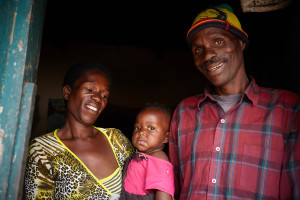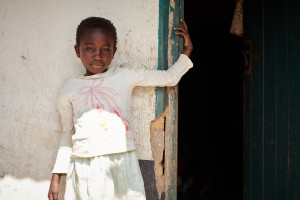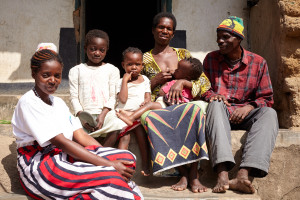Leaving No Child Behind

Mefa, her husband, and youngest child
“I first knew my HIV status in 2008. I just assumed my other children were OK,” says Mefa Mtifinyire from Malawi. “With a family to raise and the far distance to the health facility, getting the time to take them was not easy. I think I preferred to live in denial.” That was the case until Mefa was identified by a mothers2mothers (m2m) Community Mentor Mother, trained in a comprehensive package of services that includes paediatric case finding and support.
When Mefa was seven months pregnant, she received her first visit from m2m Community Mentor Mother Fanny Barton, who is responsible for households in Bangwe, Southern Malawi. While most of their conversation revolved around Mefa’s obvious priority – her HIV status and how to protect her unborn child from infection – what she did not expect to be asked was whether her two older children had been tested for HIV, since she was positive when pregnant with them.
Mefa is far from alone in not testing her children. Identifying and testing HIV-exposed children and linking those who turn positive to care has not progressed in parallel with improvements in prevention of mother-to-child transmission (PMTCT) services. PMTCT interventions have resulted in a 60% drop in new infections among babies in just six years, according to a new report from UNAIDS. In contrast in Malawi, only half of HIV-positive children receive antiretroviral therapy (ART). Of an estimated 101,000 children who are living with HIV, only 51,105 have been identified and are currently on treatment.
m2m Malawi is working to make sure that no child is left behind where testing and treatment are concerned. All Mentor Mothers, based both at health facilities and within communities, are trained to carry out RMNCH/PMTCT and paediatric case follow up and support as part of the comprehensive package of services they offer. “When I visit a client, I find out if she knows her status and if she has a partner, whether he has been tested,” explains Fanny. “Then I ask if she has other children and if they have been tested. Most people do not realise that their children need to be tested, plus there is also fear around the idea.”
With Fanny’s encouragement, Mefa – who had not been regularly attending her antenatal appointments – began doing so at Bangwe Health Centre, and she mustered up the courage to take her two daughters, aged five and nine, for testing.

Mefa’s oldest daughter
Mefa also feels relieved that the baby she was pregnant with when Fanny first visited her is now a thriving 19-month old and tested negative at her final HIV test. In fact, as a result of m2m’s comprehensive quality client management approach, more women in Malawi, like Mefa, are having their children take the final HIV test between 18-24 months – increasing from 31% in 2014 among m2m clients to 62% in 2015.
Fanny continues to support the family, ensuring that each of them are going for their ARV refills on time and that they are taking their drugs correctly, especially Mefa’s daughter. “Normally a parent will be very disappointed to learn that their child is HIV-positive. My role is to encourage them to look after themselves, and to be free with their child and love them just the same. I believe that clients who receive services and basic education on health matters can live longer than those who don’t,” Fanny says.

Mentor Mother Fanny (left) and Mefa and her family
With Fanny’s education and support, Mefa and Charles now understand so much more about HIV and the importance of testing and treatment. “My hope for my children, especially my daughter, is that she will grow and live to see many good years. Through my relationship with Fanny, I feel like my daughter has been rescued,” Mefa says.






















